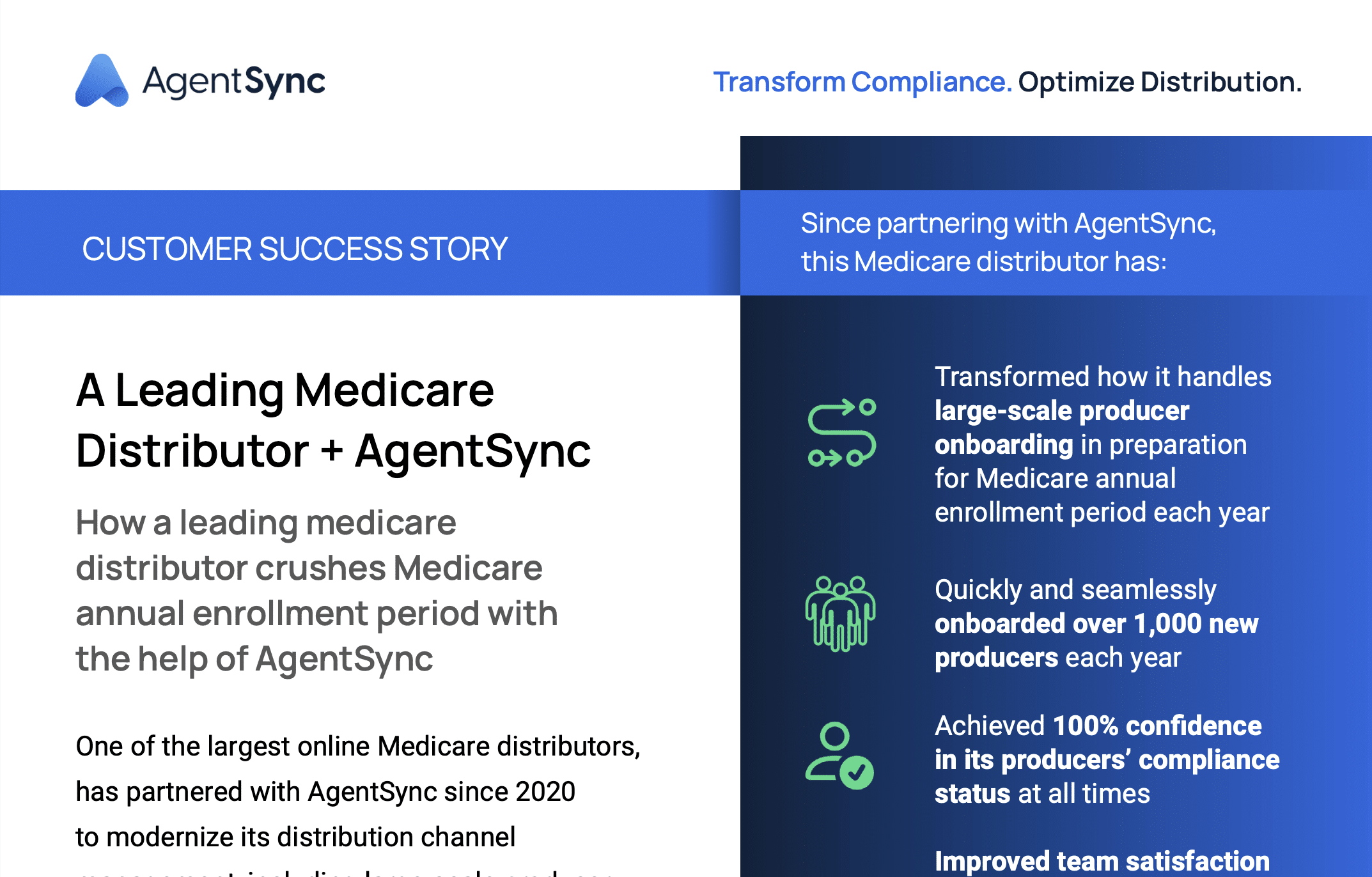

Outside it was sunny, and inside the AC was on full blast as execs, wonks, and stakeholders across the Medicare health insurance industry gathered for the Medicarians 2025 conference from March 30 to April 2 in Las Vegas.
Sessions were a who’s who of leaders in Medicare Advantage, Medicare Supplement, life insurance, auxiliary insurance, annuities, regulation, and third-party supporters. Flo Rida threw an end-of-conference party. And in between, the AgentSync team was enjoying the conversations and atmosphere happening at Booth 427 (if you know, you know).
Whether you were there in person or you’re catching up, we’ve rounded up our key takeaways from the floor and sessions:
No. 1: Advantage insurers must adapt to tech requirements and shrinking margins
The Centers for Medicare and Medicaid Services (CMS) is tightening the belt on reimbursements and is changing expectations for how health insurers in the space are allowed to use prior authorizations.
For Medicare Advantage insurers that have run on paper-based processes for years, CMS is driving new tech-based requirements, such as the legal requirement that carriers must offer their insureds portals and streamlined, digital processes to apply for prior authorization for medical procedures. CMS now has federally mandated turntimes for carriers to respond to prior authorization requests. And, perhaps most responsible for the ado at Medicarians 2025 is the CMS requirement that, by 2027, Medicare Advantage insurers will offer API-driven prior authorization requests with standardized end-to-end transactions.
Carriers that have already digitized their processes will have a distinct advantage over their manual counterparts, surely. But, as both sessions and chatter on the event floor can attest, carriers and agencies alike are grappling with how to meet new standards while also facing the program’s near-inevitable shrinking margins.
A sampling of sessions:
- We’ve Got an Image Problem: How Agents & Distributors Can Work With (and Not Against) Regulators
- What a Difference a Year Makes: The 2024 Final Rule, “The Lawsuit,” and Where We Go from Here
- Navigating Medicare Advantage in 2025
- Sustainable and Strategic Growth
- MA Marketing Under CMS’s Changing Terms
No. 2: With ACA and other federal changes, evolution is the name of the game
The Affordable Care Act is still around, but how it fits into the modern regulatory landscape and shifting interpretations at the federal level is a matter of debate. With a political administration that is out for change and unafraid of making waves, staff at health insurers and agencies can be forgiven for feeling some whiplash.
But the reality stands: Anyone whose business is subject to federal regulation ought to be optimizing for change management. Those that can move quickly — yes, even at a nationwide scale — to seize opportunities and overcome challenges will survive and even profit in market turbulence.
A sampling of sessions:
- Trump, Oz, and You – How Technology Can Help You Compete in an Ever-Changing World
- What the Future Holds From a Carrier Perspective
- Navigating Medicare’s Changing Landscape: How Policies & Regulations Impact Beneficiaries
- The Future of Medicare Supplement Part 1: Not All Pain is Gain
- Medicare Advantage Headwinds – Not Necessarily Tailwinds for MedSupp
No. 3: Senior health can’t exist in a financial vacuum
The event floor was buzzing with conversation amongst carriers and agencies about how to diversify their service offerings and connect the senior health and wealth markets. The reality is, the kind of insurance a senior consumer needs and can afford isn’t something that exists in isolation. The hunter-gatherer method of trying to get in front of someone just in time for their 65th birthday is great for a one-time contract payment, but it’s not a long-term business strategy.
Often, seniors are making healthcare decisions alongside a host of other considerations, such as long-term healthcare planning, retirement income planning, and estate planning. This Medicarians we saw more life insurance and annuity presentations than ever as the industry is increasingly aware that a winning model for late-state health insurance planning exists within the broader context of a financial strategy.
Carriers, agencies, and individual agents that move to a more fee-based care-centric model for business, where recurring and predictable fees tie a client to their agent is one that can weather economic storms and regulatory shifts. Hopefully we don’t have to tell you that insurance is a relationship business, but, if that’s news to you, then you’re going to love point No. 4.
A sampling of sessions:
- Leveraging Medicare Client Relationships for Retirement Planning and Annuity Sales
- Understanding a Rapidly Evolving Environment for Financial/Health Security, Aging/Long-Term Care, and Opportunities Created by the Coming Wealth Transfer Tsunami
- Unlock Cost Savings Via Proven and Scalable Dementia Care Program
- Understanding a Rapidly Evolving Environment for Financial/Health Security, Aging/Long-Term Care, and Opportunities Created by the Coming Wealth Transfer Tsunami
No. 4: Individual agents are as important as ever
Seniors are lonelier than ever, and that has an actual economic impact. Healthcare executives from various segments of the industry talked in on-the-floor conversations about the hidden costs of loneliness and how to better support social engagement and even family-based care models. Because the reality is that an informal network of care is less expensive to society (and to businesses).
If you’re thinking, “but a massive nationwide health insurance carrier isn’t in a great position to support that,” you’re not wrong. While carriers can — and are — retooling their products and having institution-level conversations about these issues, the person best-suited to have conversations at the individual level is still the individual human agent. Taking the time to sit with a client and discuss their financial outlook and plan ahead for life events and health care? It takes a personal touch.
A sampling of sessions:
- Strategic Revenue Management – How Local Health Plans Are Beating National Carriers
- Tech-Savvy and Medicare-Ready: Preparing for a Healthcare at Home Future
- Quantifying and Optimizing the Medicare Unit Economics of Distribution: Aligning Customer Acquisition with Lifetime Value
No. 5: Empowering agents with tech is survival stakes
Even as agents become more important than ever in consulting with seniors and helping connect them to Medicare, life, health, and annuity products, the model is turning upside down as our population ages. More seniors and retiring agents means consolidating books of business that are also ballooning with opportunity.
The solve? Technology.
From AI tools to APIs and automations, the pitch stage was bursting with businesses ready to support today’s carriers and agencies in unlocking their agents from administrative tasks to give them more time for that crucial personal touch.
- Technology and Tools for the Multifaceted Agent
- Is Your Software Giving You More Free Time? It Should Be.
- How Can Innovative Customer Acquisition Solutions Help You Achieve Your Medicare Enrollment Goals?
- REM: Automating Commission Management for Insurance Agents with AI
- The AI PDP Agent and How AI Will Make Field Agents 10x More Productive
At AgentSync, we couldn’t be more in on the message of eliminating manual repetitive work for your agents and leveraging their time for productive, interpersonal conversations. If you attended Medicarians 2025 in Las Vegas, we at Booth 427 hope you made it home happy, healthy, and hydrated. Find us again at one of our other events; otherwise, we’ll see you next year!

